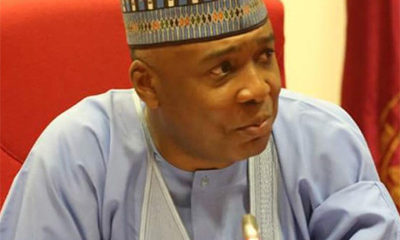News
Atiku Names Tinubu, Aisha Buhari In 30-Person List Of Corrupt People Working With Buhari

Eniola Olayemi
Rivalry between the ruling All Progressives Congress (APC) and the main opposition Peoples’ Democratic Party (PDP) took a new dimension yesterday when former Vice President and presidential candidate of the PDP, Alhaji Atiku Abubabar, reeled out 30 names working with President Muhammadu Buhari who are all accused of corruption, in one way or the other.
Some notable names among the allegedly corrupt APC chieftains, according to Atiku, include; former governor of Edo State and National Chairman of the APC, Adams Oshiomhole; a serving senator and former Governor of Nasarawa State, Abdullahi Adamu; Lagos socialite and Director General of Nigerian Tourism Development Corporation (NTDC), Folarin Coker; the Minister of Information, Alhaji Lai Mohammed; former Lagos State governor and National Leader of the APC, Senator Bola Tinubu; Chief of Staff to President Muhammadu Buhari, Alhaji Abba Kyari; sacked former Secretary to the Government of the Federation (SGF), Babachir Lawal; the Chief of Army Staff, Lt. Gen. Tukur Buratai; the minister of state transport (Aviation), Senator Hadi Sirika; The First Lady, Hajia Aisha Buhari; and the Executive Director, National Film and Video Censors Board, Mr. Adedayo Thomas; former governor of Bauchi State, Adamu Muazu; former Osun State Deputy Governor, Senator Iyiola Omisore; former pension chief, Abdulrasheed Maina; former Minister of State for Defence, Senator Musiliu Obanikoro; and former governor of Abia State, Chief Orji Uzor Kalu.
Also listed is the Bauchi State government under Governor Isa Yuguda; former governor of Akwa Ibom State, Senator Godswill Akpabio; Vice President, Prof. Yemi Osibanjo; Kano State Governor, Abdullahi Umar Ganduje; a two-term former governor of Jigawa State, Alhaji Seminu Turaki; in-law to President Buhari, who is the Executive Secretary, Border Communities Development Agency (BDCA), Alhaji Junaid Abdullahi, and former governor of the state who is currently in charge of Buhari’s campaign in Sokoto State, Alhaji Aliyu Wamako.
Others are; the gubernatorial candidate of the APC in Imo State and a close associate of President Buhari, Senator Hope Uzodimma; serving Minister of Transportation and Director-General of the Buhari Campaign Organisation in 2015, who has been charged with the task of ensuring that Buhari is elected a second time, Hon. Rotimi Amaechi; and the embattled Zamfara State governor, Alhaji Abdul’ aziz Yari.
Others include the Group Managing Director, Nigerian National Petroleum Corporation (NNPC), Maikanti Baru; and the suspended Director-General, National Intelligence Agency (NIA), Mr. Ayodele Oke.
While Oshiomhole was linked with petitions over allegations of large scale corruption, during his days as governor of Edo State by a human rights crusader, Bishop Osadolor Ochei, the PDP also pointed accusing fingers in his direction in connection with alleged financial inducements during the last APC primaries. Adamu, one of President Buharis’s allies in the Senate, is being prosecuted alongside 18 others for allegedly stealing N15 billion from the treasury through contracts awarded when he was governor for eight years.
While Coker faces N3billion fraud charge, Lai Mohammed was alleged to have begged his subordinates at the National Broadcasting Commission (NBC) for a ‘loan’ of 13 million to enable him travel to China.
Tinubu’s Alpha Beta is facing N100 billion corruption allegation, according to Atiku’s Special Assistant on Public Communications, Mr. Phrank Shaibu who released the 30 names and the corruption allegation against eaqch of them.
The statement alleged Babachir’s involvement in the infamous grass-cutting scandal as the SGF.
Shaibu alleged that Buratai allegedly bought two Dubai mansions for $1.5 million; Sirika was accused of siphoning over N1.2 billion on a phony Nigeria Air project, which was eventually suspended by the federal government.
The First Lady was said to have made the list for reporting her ADC, Sani Baban-Inna, to the security agencies over allegation of swindling members of the public of the sum of N2.5 billion.
Muazu has N19.8 billion case of corruption with the EFCC, but he has “taken refuge with the APC.” While Omisore’s N1.3 billion fraud charge is still pending, he is already seeking political refuge in the APC.












